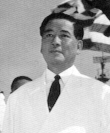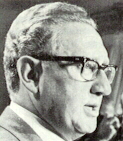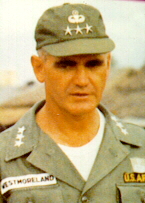Military and Political Leaders
![]()
 (1901-1963) Ngo
Dinh Diem was South Vietnam's first president. Diem dedicated his life to setting
up a free democratic Vietnam. In the 40's, he worked towards freeing Vietnam from France
and Communism. In 1954 when Vietnam split, Diem was appointed prime minister of South
Vietnam by Emperor Bao Dai. In 1955, Diem was elected President of the Republic of South
Vietnam. Soon afterwards, Diem took on the demeanor of a dictator and became increasingly
unpopular. He served until 1963 when a group of army officers took over the government and
killed him.
(1901-1963) Ngo
Dinh Diem was South Vietnam's first president. Diem dedicated his life to setting
up a free democratic Vietnam. In the 40's, he worked towards freeing Vietnam from France
and Communism. In 1954 when Vietnam split, Diem was appointed prime minister of South
Vietnam by Emperor Bao Dai. In 1955, Diem was elected President of the Republic of South
Vietnam. Soon afterwards, Diem took on the demeanor of a dictator and became increasingly
unpopular. He served until 1963 when a group of army officers took over the government and
killed him.
![]()
 (1908-1973) Lyndon Baines Johnson became the 36th
President of the United States hours after the assassination of President Kennedy. Though
born in a small town in central Texas, Johnson rose to serve his country as a U.S.
Representative, a U.S. Senator, and Senate Democratic Leader (age of 44). He combined 24
years of experience in Congress to become Vice-president and eventually President.
Although he carried a "can-do" attitude in passing bills, he suffered during and
after the Vietnam War ended. His failure in leading the nation during the war led to his
political failure, making a second term out of the question. He died on January 22, 1973,
from a heart attack.
(1908-1973) Lyndon Baines Johnson became the 36th
President of the United States hours after the assassination of President Kennedy. Though
born in a small town in central Texas, Johnson rose to serve his country as a U.S.
Representative, a U.S. Senator, and Senate Democratic Leader (age of 44). He combined 24
years of experience in Congress to become Vice-president and eventually President.
Although he carried a "can-do" attitude in passing bills, he suffered during and
after the Vietnam War ended. His failure in leading the nation during the war led to his
political failure, making a second term out of the question. He died on January 22, 1973,
from a heart attack.
"He'll be a United States Senator some day."
-Samuel Ealy Johnson, Sr., on the day LBJ was born.
![]()
 (1917-1963) John Fitzgerald Kennedy was the youngest man
ever elected to the office of President of the United States at the age of 43. He was not
only loved and supported by his fellow Americans, but he was also held in great esteem by
foreign leaders. During his administration, he improved foreign relations with the Soviet
Union while managing to take care of the Cuban missile crisis. The space administration
was at an all-time high with the first manned space flights. He initiated the talks
between the Communists and South Vietnam. On November 22, 1963, John Kennedy was shot to
death on a trip to Dallas by Lee Harvey Oswald.
(1917-1963) John Fitzgerald Kennedy was the youngest man
ever elected to the office of President of the United States at the age of 43. He was not
only loved and supported by his fellow Americans, but he was also held in great esteem by
foreign leaders. During his administration, he improved foreign relations with the Soviet
Union while managing to take care of the Cuban missile crisis. The space administration
was at an all-time high with the first manned space flights. He initiated the talks
between the Communists and South Vietnam. On November 22, 1963, John Kennedy was shot to
death on a trip to Dallas by Lee Harvey Oswald.
"And so, my fellow Americans: ask not what your country can do for you--ask what you can do for your country."
![]()
 (1923-
) Henry A. Kissinger was secretary of state from 1973-1977. He was
appointed by Nixon and stayed when Gerald Ford was elected President. He was also a top
foreign policy expert and national security advisor to both Presidents. From 1969-1973, he
participated in secret negotiations with the North Vietnamese, in an effort to stop the
Vietnam War. He also went to the Soviet Union and China to prepare for Nixon's visits
there. He also served under President Reagan on a commission to create foreign policy
concerning Central America.
(1923-
) Henry A. Kissinger was secretary of state from 1973-1977. He was
appointed by Nixon and stayed when Gerald Ford was elected President. He was also a top
foreign policy expert and national security advisor to both Presidents. From 1969-1973, he
participated in secret negotiations with the North Vietnamese, in an effort to stop the
Vietnam War. He also went to the Soviet Union and China to prepare for Nixon's visits
there. He also served under President Reagan on a commission to create foreign policy
concerning Central America.
![]()
 (1913-1994) Richard M. Nixon was President during a large
part of the Vietnam War. He initiated the policy of "Vietnamization," or turning
the war over to the South Vietnamese. Nixon was the first President to visit China while
in office. He also visited the Soviet Union, and bettered relations with both Communist
powers. He brought trade agreements and nuclear arms reduction treaties between the U.S.
and the Soviet Union. After becoming entangled in the Watergate scandal, Nixon was forced
to resign. He died of a major stroke in 1994.
(1913-1994) Richard M. Nixon was President during a large
part of the Vietnam War. He initiated the policy of "Vietnamization," or turning
the war over to the South Vietnamese. Nixon was the first President to visit China while
in office. He also visited the Soviet Union, and bettered relations with both Communist
powers. He brought trade agreements and nuclear arms reduction treaties between the U.S.
and the Soviet Union. After becoming entangled in the Watergate scandal, Nixon was forced
to resign. He died of a major stroke in 1994.
"You won't have Nixon to kick around anymore."
![]()
 (1914- ) William C. Westmoreland was the Commander of
U.S. forces in Vietnam from 1964-1968. He used the "search and destroy"
strategy, which put more importance on enemy deaths than on gained territory. He issued
several optimistic statements about American progression in the war. Late in 1968 the
general became the Army's Chief of Staff.
(1914- ) William C. Westmoreland was the Commander of
U.S. forces in Vietnam from 1964-1968. He used the "search and destroy"
strategy, which put more importance on enemy deaths than on gained territory. He issued
several optimistic statements about American progression in the war. Late in 1968 the
general became the Army's Chief of Staff.![]()